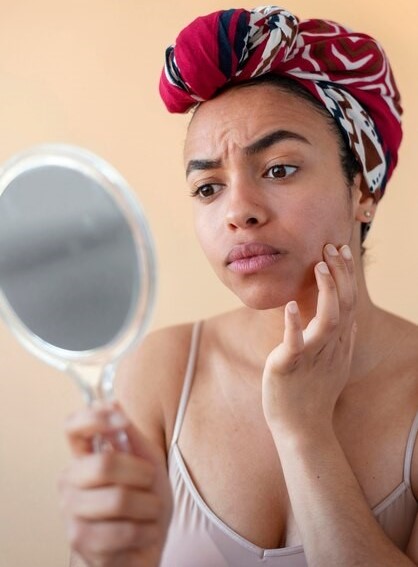Stylish women around the world understand the importance of a flawless canvas. But, when it comes to protecting that canvas from the sun’s harmful rays, the narrative gets a tad complicated.
One of the burning questions is: “Does sunscreen cause acne?” Let’s demystify this, so you can stay both stylish and protected.
The sunscreen and acne debate
A 2019 study published in the Journal of Clinical and Aesthetic Dermatology indicated that 45% of participants believed sunscreens caused breakouts. But, is there truth to this?
Sunscreen in itself doesn’t cause acne. However, certain ingredients in sunscreens can clog pores or cause sensitivity, leading to acne-like reactions. Ingredients like coconut oil or cocoa butter can be comedogenic (pore-clogging) for some. It’s also essential to consider the type of sunscreen – physical or chemical. Each has its own set of benefits and potential drawbacks for acne-prone skin.
Physical vs. chemical sunscreens
Physical sunscreens: These sit on the skin’s surface and deflect harmful UV rays. They contain ingredients like zinc oxide and titanium dioxide.
Pros: Less likely to irritate sensitive skin. Cons: Might leave a white cast, especially on darker skin tones.
Chemical sunscreens: These absorb UV rays before they can damage your skin. They contain compounds like avobenzone and octinoxate.
Pros: Tends to be more wearable under makeup due to a sheer finish. Cons: Higher chances of skin irritation.
Embrace the sun, but do it wisely
Picking the best sunscreen for acne-prone skin
Non-comedogenic: This term means the product is specifically formulated not to clog pores. Look for sunscreens labeled non-comedogenic. According to a survey by Healthline, 70% of women found that switching to a non-comedogenic sunscreen reduced their acne occurrences.
Oil-free: Especially important if you’re already battling oily skin. Oil-free formulas are lighter and less likely to contribute to breakouts.
Broad spectrum: Ensure your sunscreen protects against both UVA and UVB rays. This isn’t directly related to acne but is crucial for overall skin health.
SPF: Dermatologists, as per the American Academy of Dermatology, recommend using sunscreen with at least an SPF of 30. This blocks 97% of the sun’s UVB rays.
Gel-based: If you’re especially prone to breakouts, a gel-based sunscreen can be an excellent option. They’re lightweight and dry quickly without leaving a residue.
Added benefits: Some sunscreens come infused with ingredients beneficial for acne-prone skin. For instance, niacinamide, which not only provides UV protection but also reduces inflammation and redness associated with acne.
Reapplication
While choosing the right sunscreen is half the battle, ensuring its efficacy is another key. No matter how high the SPF, sunscreens break down over time. A survey from Mayo Clinic highlighted that 80% of participants weren’t reapplying sunscreen as often as recommended. For continuous protection, reapply every two hours, and immediately after swimming or sweating.
Conclusion
Navigating the world of skincare while trying to stay stylish can sometimes feel overwhelming. But remember, a sunburn or sun damage isn’t stylish. So, while there might be some trial and error involved, finding a sunscreen that complements your acne-prone skin will be worth the effort.
Embrace the sun, but do it wisely, with your skin’s health at the forefront. Here’s to flaunting a sun-protected, acne-free glow!


